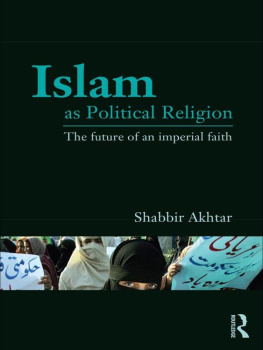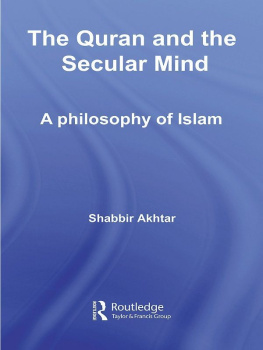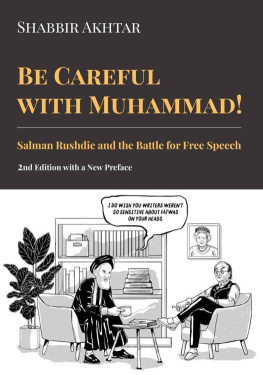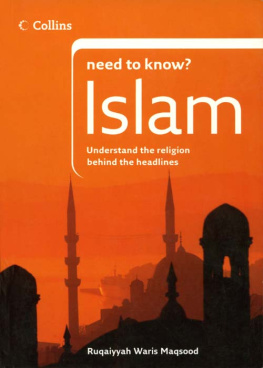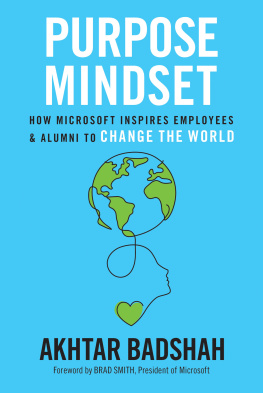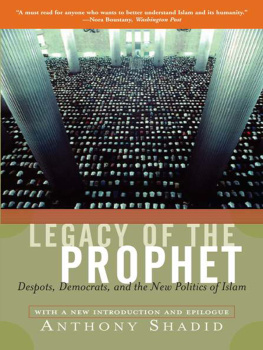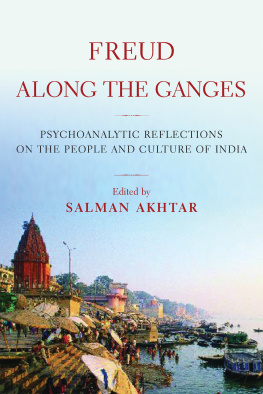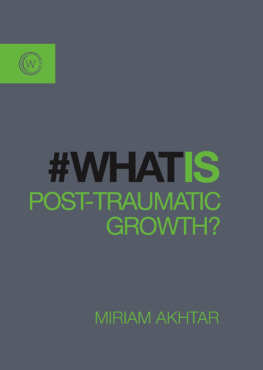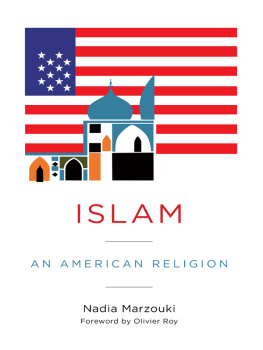Shabbir Akhtar - Islam as Political Religion
Here you can read online Shabbir Akhtar - Islam as Political Religion full text of the book (entire story) in english for free. Download pdf and epub, get meaning, cover and reviews about this ebook. year: 2010, publisher: Taylor and Francis, genre: Religion. Description of the work, (preface) as well as reviews are available. Best literature library LitArk.com created for fans of good reading and offers a wide selection of genres:
Romance novel
Science fiction
Adventure
Detective
Science
History
Home and family
Prose
Art
Politics
Computer
Non-fiction
Religion
Business
Children
Humor
Choose a favorite category and find really read worthwhile books. Enjoy immersion in the world of imagination, feel the emotions of the characters or learn something new for yourself, make an fascinating discovery.
- Book:Islam as Political Religion
- Author:
- Publisher:Taylor and Francis
- Genre:
- Year:2010
- Rating:4 / 5
- Favourites:Add to favourites
- Your mark:
- 80
- 1
- 2
- 3
- 4
- 5
Islam as Political Religion: summary, description and annotation
We offer to read an annotation, description, summary or preface (depends on what the author of the book "Islam as Political Religion" wrote himself). If you haven't found the necessary information about the book — write in the comments, we will try to find it.
Islam as Political Religion — read online for free the complete book (whole text) full work
Below is the text of the book, divided by pages. System saving the place of the last page read, allows you to conveniently read the book "Islam as Political Religion" online for free, without having to search again every time where you left off. Put a bookmark, and you can go to the page where you finished reading at any time.
Font size:
Interval:
Bookmark:
Islam as Political Religion
This comprehensive survey of contemporary Islam provides a philosophical and theological approach to the issues faced by Muslims and the question of global secularization. Engaging with critics of modern Islam, Shabbir Akhtar sets out an agenda of what his religion is, and could be, as a political entity.
Exploring the views and arguments of philosophical, religious and political thinkers, the author covers a raft of issues faced by Muslims in an increasingly secular society. Chapters are devoted to the Quran and Islamic literature; the history of Islam; Sharia law; political Islam; Islamic ethics; and political Islams evolving relationship with the West. Recommending changes which enable Muslims to move from their imperial past to a modest role in the power structures of todays society, Akhtar offers a detailed assessment of the limitations and possibilities of Islam in the modern world.
Providing a vision for an empowered yet rational Islam that distances itself from both Islamist factions and Western secularism, this book is an essential read for students and scholars of Islamic studies, religion, philosophy and politics.
Shabbir Akhtar is Associate Professor of Philosophy and Religious Studies at Old Dominion University in Norfolk, Virginia. This political work is a sequel to his philosophical treatise The Quran and the Secular Mind (Routledge, 2007). He has written a number of articles and books on philosophy of religion, Christianity and Islam, and is currently working on a book on Islamic humanism.
Islam as Political Religion
The future of an imperial faith
Shabbir Akhtar

LONDON AND NEW YORK
First published 2011
by Routledge
2 Park Square, Milton Park, Abingdon, Oxon OX14 4RN
Simultaneously published in the USA and Canada
by Routledge
270 Madison Ave, New York, NY 10016
Routledge is an imprint of the Taylor & Francis Group, an Informa business
This edition published in the Taylor & Francis e-Library, 2010.
To purchase your own copy of this or any of Taylor & Francis or Routledges collection of thousands of eBooks please go to www.eBookstore.tandf.co.uk.
2011 Shabbir Akhtar
The right of Shabbir Akhtar to be identified as author of this work has
been asserted by him in accordance with sections 77 and 78 of the
Copyright, Designs and Patents Act 1988.
All rights reserved. No part of this book may be reprinted or reproduced or
utilised in any form or by any electronic, mechanical, or other means, now
known or hereafter invented, including photocopying and recording, or in
any information storage or retrieval system, without permission in writing
from the publishers.
British Library Cataloguing in Publication Data
A catalogue record for this book is available from the British Library
Library of Congress Cataloging in Publication Data
Akhtar, Shabbir, 1960
Islam as political religion : the future of an imperial faith / Shabbir Akhtar.
p. cm.
Includes bibliographical references and index.
1. Islam and politics. 2. Islam and secularism. 3. Islam and culture.
4. Religion and politics. I. Title.
BP173.7.A4925 2011
297.272dc22 2010017592
ISBN 0-203-84182-4 Master e-book ISBN
ISBN 978-0-415-78146-6 (hbk)
ISBN 978-0-415-78147-3 (pbk)
ISBN 978-0-203-84182-2 (ebk)
Typically, I retain the final h to indicate feminine nouns. Arabic has no upper case but I capitalize proper nouns and the initial word in transliterated titles of Arabic works. Some words can occur with an upper case  and a lower case (qur
and a lower case (qur n). This is explained in the text. Elision of vowels is not indicated. I use the Library of Congress system for Arabic transliteration to indicate consonants unique to Arabic
n). This is explained in the text. Elision of vowels is not indicated. I use the Library of Congress system for Arabic transliteration to indicate consonants unique to Arabic 
Many words, notably Islam, Quran, Ramadan, Muhammad, hadith (Muhammads traditional saying), fatwa, jihad, Shariah (holy law) and Shiite are being increasingly naturalized into English as Islam becomes part of the Western cultural landscape. In such words, the length of vowel, any diacritical dots, and glottal () and guttural () stops, are rarely indicated.
Although our time frame is supplied by the common (Christian) era, dates are given in varied but consistent ways. An unqualified date always refers to the Christian calendar. I use the Islamic chronology of BH and AH (before and after the Prophets exodus or hijrah to Medina). For seminal events, I offer Christian and Islamic dates, thus highlighting historical interactions between these religious superpowers. Dates of death only are given for classical scholars. For rulers, including all caliphs except the first four, only regnal periods are supplied. For important figures in modern history, I give dates of birth and death.
Islam is associated with a misanthropic political vengeance and apparently motiveless malice exhibited daily in the worlds crowded headlines. Its towering twin public countenances are a mystical faith of peace and a ferocious political ideology dedicated to world conquest through indiscriminate violence. Owing to this Janus-faced reputation, some European critics gave Islam the benefit of the doubt and were, as recently as 1989 when the Rushdie affair erupted, kind enough to eulogize it as potentially the best religion with the worst followers. Two decades later, practically all Westerners lament that Islam is the worst faith with the worst followers. Islam as political religion is now uniformly condemned as a resolutely intolerant, potentially totalitarian, unmanageably anarchic, dangerously subversive, irredeemably misogynistic, irrationally homophobic and avowedly imperialistic form of theocratic terrorism which aims to forcibly assimilate the secular and Christian worlds to its own obscurantist norms while rejecting offers of democratic compromise and eirenic accommodation.
Some Western extremists accuse Muslims of a new conquest of post-Christian Europe. Once Gods continent, it is now renamed Eurabia or Europistan, conquered this time via immigrant infiltration and intimidation, not direct invasion. Such conspiratorial charges are supported by anxieties about the reach and purpose of Muslim, mainly Saudi, philanthropic donations to major Western universities. Is this a subtle attempt to monopolize and censor the study of Islam in the West, thus undermining secular freedoms of research, inquiry and speech?
Many non-Muslims sincerely wonder why Muslims, alone among religious believers, refuse to become citizens of a global political and economic order. This is a fair question. While we belong to many faiths, we remain a single humanity and share the planet. For those of goodwill who affirm the beatitude, Blessed are the peace-makers, the Islamic question is urgent, not merely theological. As an organic amalgam of secular and religious concerns, Islam resists secularization at a time when the gods of other faiths are competing to fall prostrate at the altar of secularism.
Two decades ago, during the Rushdie affair, I publicly argued that Islamic reform derives its authority from the attempt to resist and confront, not assimilate secular, political and artistic modernity. Religious reformers need religious, not intellectual, authority, in order to be credible to their co-religionists. That is why Sayyid Qutb and Ayatollah Khomeini and other activists succeeded in influencing the Islamic world while the exiled Muslim intellectuals who plan to reform Islam, from the safety of their apartments in London and Paris, are ridiculed in the Muslim world. They are seen as resident stooges and puppets of the West as opposed to the Western-appointed puppets governing the Muslim masses in their own homelands. Western-based Muslim thinkers who labour hard to create a so-called moderate that is, politically impotent Islam fully acceptable to the West, are dismissed as agents of the West.
Font size:
Interval:
Bookmark:
Similar books «Islam as Political Religion»
Look at similar books to Islam as Political Religion. We have selected literature similar in name and meaning in the hope of providing readers with more options to find new, interesting, not yet read works.
Discussion, reviews of the book Islam as Political Religion and just readers' own opinions. Leave your comments, write what you think about the work, its meaning or the main characters. Specify what exactly you liked and what you didn't like, and why you think so.

